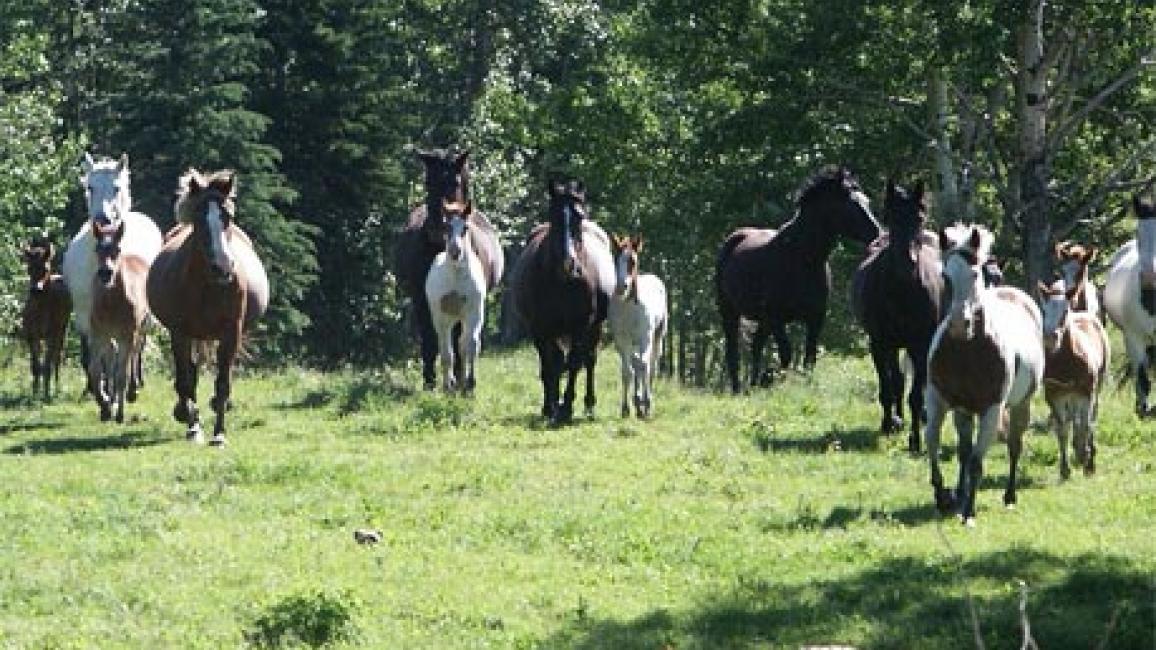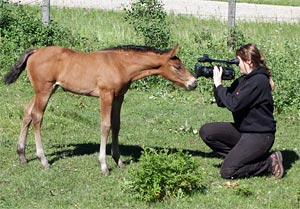Female hormone replacement drug Premarin and horses

Sometimes we don’t know why we were put on the planet until we arrive at our destination. Consider Tammy Craven and Vikki Dean who found themselves in Canada recently, rescuing horses who had been displaced by the closure of 50 farms. The farms were part of the industry that produces the controversial female hormone replacement drug Premarin (Wyeth Pharmaceuticals).
It may seem like folly since there are an estimated 30,000 of these horses who now face death in slaughterhouses or an uncertain future at auction. Tammy and Vikki started by buying horses out of their own funds and taking home 34 of them to Canyon Creek Farm in Acton, California.
But like the parable of the starfish being thrown back into the ocean, these are 34 fewer horses without a future. As horses are adopted, Vikki and Tammy plan to return for more. They would gladly welcome help from other people committed to the well being of these animals.
At-risk horses on "pregnant mare urine" (PMU) farms
"Each year, hundreds of purebred mares are pasture bred on each PMU (pregnant mare urine) farm to keep the drug industry supplied with estrogen. It is a vicious cycle, and with the farms now out of business, all the horses, mares, foals, yearlings and stallions are at risk. The horse market in Canada is saturated and the horses need our commitment to help them find homes immediately," Vikki said.
Part of their mission is to also create public awareness of the conditions to which the horses on the 140 still active PMU farms are being subjected. According to Vikki and Tammy, the pregnant mares are forced to stand in tiny stalls, hooked to urine collection devices for six to seven months a year. Their foals are considered to be the byproducts of this industry.
"The conditions are inhumane," Vikki said. "We don’t blame the farmers, however. Many of them have been in operation for generations and this is the only life they know. In fact our hearts go out to those farmers who have lost their farms and livelihood since reports began to surface that the drug they played in a role in producing may cause health problems like breast cancer."
Tammy admits she is still a little stunned at how quickly her world has changed but she has no regrets:
"I should be very frightened by the amount of money that Vikki and I have invested, but these actions are completely justified in our hearts. We are horse-loving women, one recently divorced (me) the other a widow; both leading successful, but now empty lives.
"Each day I woke up wondering what life was really about. Tormented by loss and grief -- I had also just lost my father -- it was time to focus my energy into a worthwhile project. I came across this PMU issue on the Internet. I hopped on a plane with my checkbook (she had taken out an equity line of credit from her ranch). Vikki, my close friend, wouldn't let me travel alone.
"During my horse buying (saving) frenzy, she was deeply moved and made a life-changing decision to also get involved. As I was totaling the list and writing out this huge check, she looked over and told me that she had brought her checkbook too."

A hidden pharmaceutical industry
"Together our mission escalated into buying the horses, educating the public and also producing a documentary about this very hidden industry. Vikki is seeking to sell out her business and focus possibly full time on this now not-for-profit mission.
"Suddenly it seemed that everything I have done with my life, career (TV industry), knowledge and passion for animals, the ranch I have built for 17 years, friends that I have met ... could all be channeled into saving these horses.
"Driven by our hearts we have not looked back or second guessed how this could work. Call it divine intervention or complete insanity; we suddenly knew too much and could not rest until we had done everything in our power to relieve this situation."
Alternatives to Premarin
Tammy also said it is important to get the word out that there are alternatives to Premarin.
"Vikki and I are approaching that time of life as we are both over 40. My mother and sister were afraid of hormone replacement drugs. Being from Kentucky it could be considered backwards thinking, but their doctor referred to menopause as "the change of life;" he told my family, that it was a natural process and that the female body had ceased making estrogen for a reason.
"My mother is now 85, my sister is 62; both went through "the change" without complications, and are in perfect health thanks to this very wise physician. Vikki's mom has just stopped taking Premarin. We have managed to educate our friends; it was shocking to know that many of them were taking some form of the drug and were completely unaware of its origin. We have also been telling the medical community as well. Education is the key!
Donate to help at-risk horses.
Photos courtesy of Canyon Creek Farm